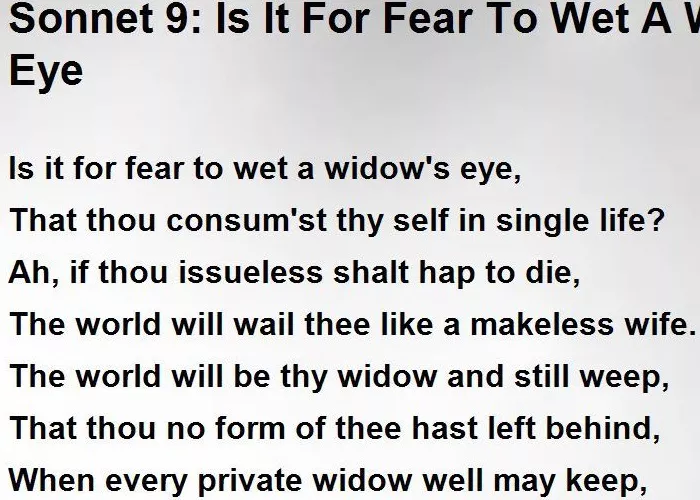William Shakespeare‘s Sonnet 9 is a poignant meditation on the fleeting nature of beauty and youth, the destructive power of time, and the inevitability of mortality. As part of his famed sequence of 154 sonnets, this particular poem addresses a significant theme that runs throughout much of his work: the tension between transient beauty and the enduring power of poetry. With an elegant yet somber tone, Shakespeare invites the reader to consider how time’s ravages strip away the physical beauty of youth, yet poetry offers a potential form of immortality by immortalizing these qualities in verse.
Shakespeare’s Sonnet 9
Is it for fear to wet a widow’s eye
That thou consum’st thyself in single life?
Ah, if thou issueless shalt hap to die,
The world will wail thee like a makeless wife;
The world will be thy widow and still weep
That thou no form of thee hast left behind,
When every private widow well may keep,
By children’s eyes, her husband’s shape in mind.
Look what an unthrift in the world doth spend
Shifts but his place, for still the world enjoys it;
But beauty’s waste hath in the world an end,
And, kept unused, the user so destroys it.
No love toward others in that bosom sits
That on himself such murd’rous shame commits.
Structure and Rhetoric
The sonnet follows the conventional Shakespearean form, consisting of 14 lines written in iambic pentameter, with a rhyme scheme of ABABCDCDEFEFGG. This structure is notable for its tight organization, which allows Shakespeare to unfold his argument in a disciplined way. The first twelve lines are divided into three quatrains, each developing a different facet of the theme, while the final couplet presents a conclusion or resolution.
The Theme of Mortality and Time
The poem opens with a meditation on the passage of time and its effect on beauty. Shakespeare immediately sets up a stark contrast between the transience of youth and beauty and the permanence of time’s effects. The speaker addresses a “lovely boy,” urging him to consider the ravages of time:
“If you were ever fair, and justly praised,
If you were ever fair, then you must die.”
These opening lines serve as a reminder that beauty, though celebrated in youth, is not immune to time’s decay. The phrase “you must die” is blunt and direct, illustrating the inevitability of death. Shakespeare often grapples with time’s destructive nature, and here he emphasizes that beauty, no matter how cherished, is subject to the same mortality that claims all living things.
The Paradox of Beauty and Procreation
In the second quatrain, Shakespeare introduces the idea of procreation as a way to combat the decay of beauty. He suggests that, by having children, the boy can “preserve” his beauty in his offspring, thus perpetuating his image and extending his legacy:
“Then let not winter’s ragged hand deface
In thee thy summer, ere thou be distill’d.”
Here, Shakespeare uses the metaphor of “winter” as an image of decay and death, while “summer” represents youth and vitality. The idea of distilling beauty into progeny is an attempt to push back against time’s inevitable pull. However, there is an inherent tension in this suggestion. The youth’s beauty will inevitably fade, and even the act of procreation can never fully escape the larger cycles of life and death.
Time as a Devouring Force
Shakespeare uses a rhetorical strategy in the third quatrain that both laments and challenges the ravages of time. Time is personified as a destructive force that consumes all things, including beauty and youth. The speaker warns that beauty’s fleeting nature cannot escape the clutches of time:
“Beauty’s effect, with the fairest of the sky,
Will fade as all things fade in this world of ours.”
This statement reinforces the theme of impermanence. No matter how beautiful or splendid something may seem, time will gradually strip it of its luster. It is not just youth that fades; all things, even the “fairest” aspects of nature, must succumb to time’s inexorable march.
The Power of Poetry as Immortality
Despite these grim reflections on time’s power, Shakespeare offers a solution—poetry itself. In the concluding couplet, the poet suggests that while beauty may fade and mortality is unavoidable, the preservation of beauty through verse grants it a form of immortality:
“But if you will not have it, come and die;
You must remain for the rest of time.”
The final line is a remarkable turn in the argument. It suggests that while the individual may not personally avoid death, their beauty, and even their life, can be immortalized through the medium of poetry. The reference to “time” in the final line connects back to the earlier lamentations about time’s destructive power, but in this case, the “rest of time” becomes an eternal presence, akin to the way great works of art or poetry endure long after their creators have passed.
Conclusion
Shakespeare’s Sonnet 9 ultimately grapples with the inevitability of time and mortality, but it also provides a means of transcending these forces through the act of creation, particularly the creation of poetry. By writing about beauty and youth, Shakespeare renders them eternal, ensuring that they continue to live on in the minds and imaginations of future generations. In this way, the sonnet becomes both a reflection on the human condition and a demonstration of its own thesis—through the written word, the fleeting is made everlasting.
Through his mastery of language, metaphor, and structure, Shakespeare crafts a sonnet that is not only a meditation on mortality but also a celebration of the enduring power of art. In Sonnet 9, he offers both a lament for the inevitable passage of time and a defiant assertion that through poetry, we can achieve a form of immortality that transcends the physical decay that time inflicts on us all.

